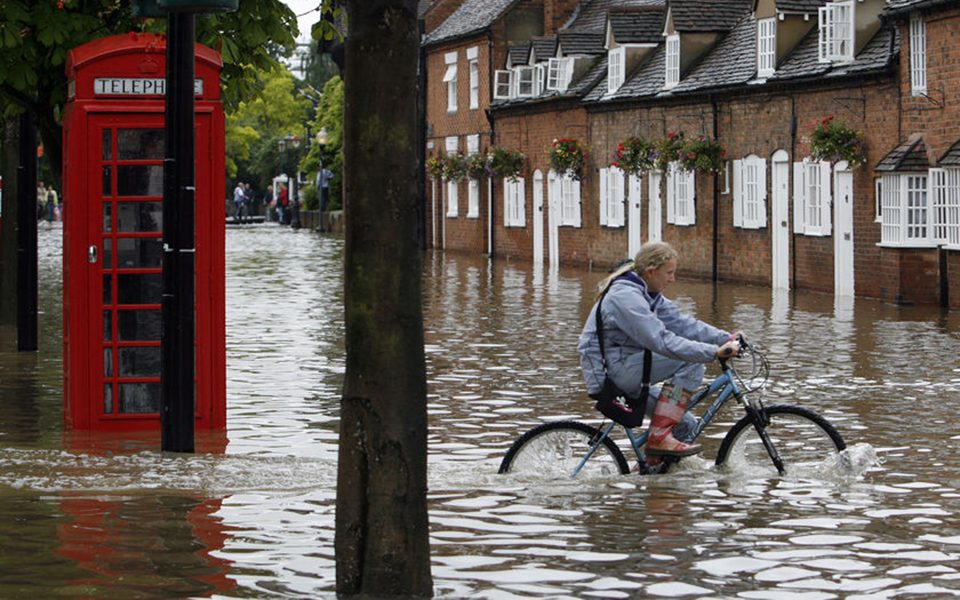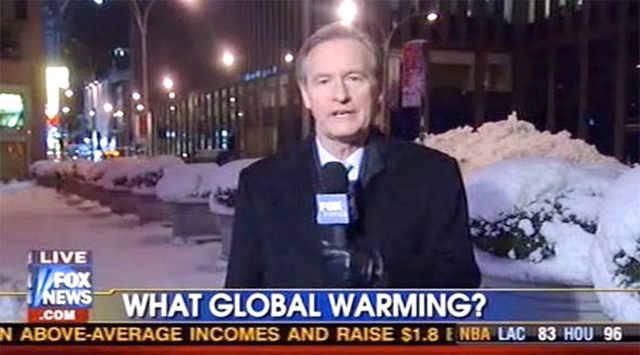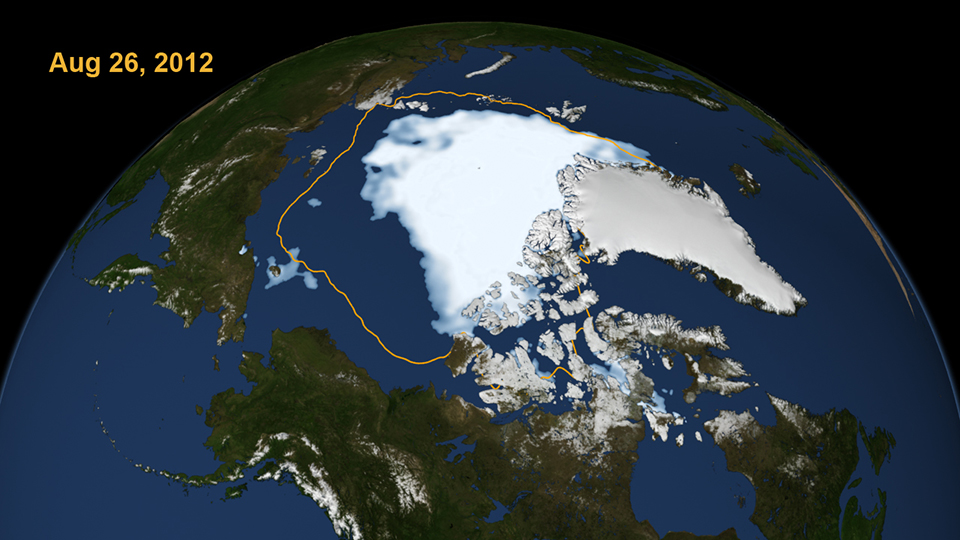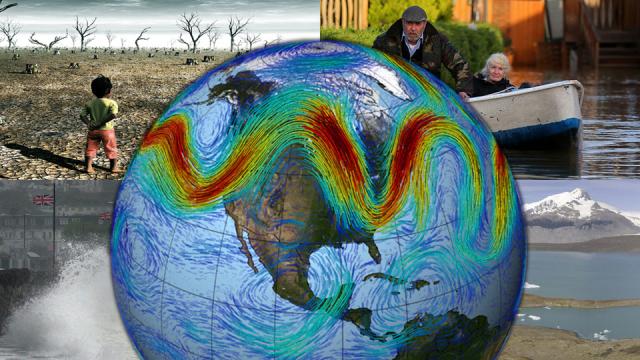
Global warming is "likely" to cause more frequent severe storms, "very likely" to trigger heavy precipitation events and "very likely" to produce extreme high sea levels, according to new projections from the International Panel on Climate Change (IPCC) whose latest report in September signaled nothing short of a climatic crisis – including increased and intensifying droughts and heat waves as the earth warms.
“A climate crisis is urgent, imminent and here,” Dr. Tero Mustonen told Occupy.com in August. Mustonen is an Arctic researcher with Snowchange, an NGO assessing the Arctic’s ecosystems in partnership with indigenous people. He calls the Arctic the "canary of the world" due to its fragility and the stark visibility of climate changes already upon us; this 2012 photo reveals the smallest ice-cap coverage ever measured by a satellite.
But the extreme storms recently battering Britain and Europe suggest you do not need to look as far as the Arctic to see climate change’s onset. "St Jude" was the first major late-year storm to hit Britain, on October 27. It killed four people with winds that reached 99 mph – the highest speeds over land in England since 1987's "Great Storm."
Hurricane "Xaver" in early December again caused fatal destruction, hitting northern Britain hardest. Wind gusts were measuredup to 142 mph. Overall, this month was measured by the U.K. Met Office as the stormiest December since records began, with three major storms occurring around the Christmas period – "Christian," "Dirk," and "Erich" – and the pattern continuing into early January. Additionally, U.K. storms do not normally have names.
Now, mid-January feels like we are straight into spring, with highs averaging those you would expect in March or April.
On trend with the majority of mainstream news, the cited articles about the storms ignore the IPCC’s connections of extreme weather to climate change.
"It is impossible to point your finger at any one example of extreme weather conditions and state categorically that it is the result of climate change. However, the recent IPCC report stated that extreme weather conditions will be a definite corollary,” Jamie Kelsey-Fry, author of The Rax Active Citizenship Toolkit and a contributing editor to New Internationalist magazine, said about U.K. media coverage.
“Only weeks after the IPCC latest report, the Philippines typhoon was the most powerful storm to hit land in history, shortly after Cyclone Cleopatra dropped a record breaking 450 millimeters of rain in an hour and a half in Sardinia," he added, "and as we all are aware, the U.S. and UK are now going through extreme weather conditions.”
Further global examples of extreme weather in 2013 substantiate the IPCC projections. Following suit with the UK winter storms, the majority of mass media reports neglect to mention climate change, including the following examples:
The Sydney Herald tells how in January 2013, Australia recorded its hottest ever month, a trend set to continue through this summer. The Australian heat even meant meteorologists had to add a new temperature color, incandescent purple, to their forecasts.
China issued its first ever "Emergency: level two heat-wave warning." Meanwhile, Central Europe faced massive flooding last summer and Sardinia received massive rainfall combined with what the Telegraph described as an "apocalyptic cyclone."
Even during the worst ever weather disaster of 2013 – the Haiyan Phillipines Typhoon – Britain's coverage from the Mirror broadcaster ITV, the Telegraph, and Sky News all failed to draw any connection between the mega-storm and climate change.
Broadly assessing the failures of the mainstream, Kelsey-Fry said, “It seems that extreme media obfuscation conditions flare up too!”
“Where are the reports on our mainstream media discussing the likely links between the current extreme weather conditions and increasing climate change?” he asked.
“We are looking at deck chairs being rearranged on the Titanic. My advice is for people to accelerate the trend to make corporate media sources obsolete by switching to sources of information that are completely free of corporate – particularly fossil fuel – influence."
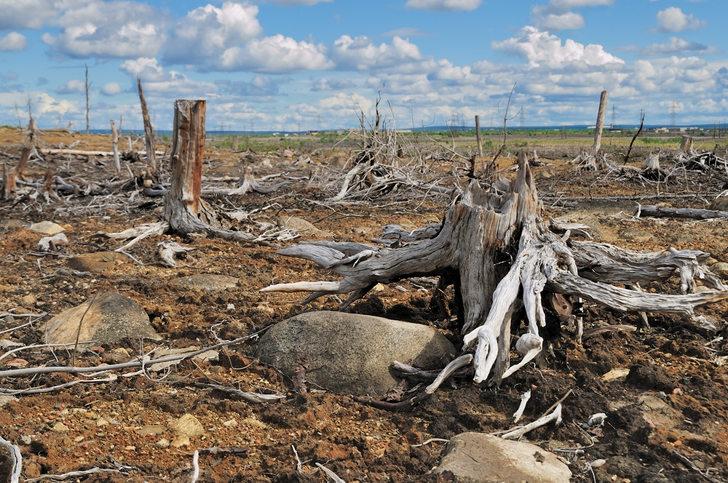
Similar accusations about Big Oil’s input and influence have been waged against the UK government. But the recent storm’s severity forced Britain's officials to call "COBR," the Cabinet Office Briefing Room. This is a procedure instigated to provide central command in the face of national emergencies.
The storms also led Sir David King, a prominent government climate advisor, to call for an end to spending cuts on sea defenses. Currently, austerity plans are in motion to reduce money for both Environment Agency workers and other British infrastructures projects. Tax expert Richard Murphy asserted that the cuts epitomize the government’s ideological agenda rather than a practical one.
After Sir King’s remarks, to groans from his own Conservative Party in the Houses of Commons, Prime Minister David Cameron recently admitted Britain was suffering more “abnormal weather events” that he suspects may be related to climate change. Yet the admission does not signal a change in policy direction.
Far from it, on Monday he announced new incentives for councils that agree to push ahead with fracking in Britain. If successful, the UK government’s efforts to extract shale gas will add immensely to climate change, as noted in a New Statesmen articlewhich presented clear ties between big oil money and the government’s decisions.
Supporting tar sands is another key policy direction that the government could change if it wanted to face its climate change responsibilities. The Canadian-focused industry is known as the most devastating project in human history, due to its impact on both ecosystems and climate change. Yet the UK government is lobbying to allow tar sands sales in Europe.
No UK Tar Sands, an NGO, cites how the government is trying to weaken the EU Fuel Quality Directive under direction from Shell, BP and the Canadian government. Furthermore, the UK government is attempting the same tactics to allow the sale ofshale gas in Europe.
It is currently unclear whether tar sands will become legal in Europe, as Britain faces broad opposition to the imports. Nonetheless, the company Valero has already started preparing for tar sands transportation including a refinery on the Welsh coast.
UK No Tar Sands also points to ways that the City of London has been central pushing the tar sands, with investments from the Royal Bank of Scotland (which received taxpayer bailout money) as well as UK banks HSBC and Barclays which are also investing heavily in the oil.
“An issue of great concern is there are climate deniers at the heart of this government and it seems London [is] one of the major centers for investing in fossil fuels,” explained Richard Solly, coordinator of London Mining Network, an alliance of human rights, development and environmental groups that attempt to curb London's role in eco-destruction.
Solly added that one of London Mining Network's member groups is the World Development Movement, which is currently running a carbon capital campaign, which he said lays bare the connections between government, major High Street banks and the fossil fuel industry.”
This business as usual, for the sake of the planet, he asserted, “has to stop.”
3 WAYS TO SHOW YOUR SUPPORT
- Log in to post comments

